
Explained: Key issues, chief contenders, challenges as Sri Lanka braces for polls
Know who are in race for the September 21 polls, key issues that will determine voting choices and expectations voters have from the next President

Sri Lanka, which is still battling a destabilising economic crisis, will vote for a new president on September 21 in a contest which is expected to be the fiercest the island nation has ever seen in its history.
Incumbent Ranil Wickremesinghe, who assumed office in July 2022 amid an unprecedented political crisis, will be among the half a dozen key contenders for power.
The other key candidates include main opposition leader Sajith Premadasa, National People’s Power leader Anura Dissanayake, former army chief Sarath Fonseka and Minister of Justice, Wijeyadasa Rajapakshe.
How is President elected?
Sri Lanka, one of the oldest democracies in the world, follows a presidential system of government. It also has a 225-member Parliament.
The President, who is the head of the state and the commander-in-chief of the armed forces, is directly elected for a five-year term. The poll is conducted under the Sri Lankan form of the contingent vote.
It is also the President who both heads and appoints the Cabinet of Ministers in Parliament. In Sri Lanka, the Prime Minister, who leads the ruling party, is second in command to the President.
What voters expect from new President?
After an economic crisis caused a political turmoil, forcing then President Gotabaya Rajapaksa, to flee the country in 2022 and then resign, the main issue confronting the 17 million voters will be economic and political stability.
Besides repaying bilateral creditors Japan, China and India, Sri Lanka has to put finishing touches on a preliminary agreement with bondholders on restructuring $12.5 billion of debt ahead of a third IMF (International Monetary Fund) review later this year.
Key issues that will steer poll results
The economic crisis of 2022 caused havoc and pushed hundreds of thousands of people into poverty and forced a large number of people including professionals to flee the country in search of greener pastures abroad.
Unending inflation, low economic growth and a stagnant job market continues to spark widespread anger and is also expected to influence the way people will vote in September.
Wickremesinghe, a seasoned politician but without a mass base, claims he deserves to be elected as he has pulled Sri Lanka from the brink of a disaster although he admits the country has a long way to go to assume its old self.
Wickremesinghe’s rivals
Wickremesinghe, however, faces competition from both Sajith Premadasa, son of former president Ranasinghe Premadasa, and leftist leader Dissanayake, whose Janatha Vimukti Peramuna (JVP), has carried out two urban insurrections, but now embraces democracy.
Both are determined to exploit the continuing mass discontent and have declared that they will rework the loan agreement with IMF to provide the people a better cushion.
But experts say that any new government will need to ensure that the economic reforms that have already been implemented are taken forward and concluded to transform the economy and put it on a positive track.
Role of Tamil, Muslim voters
Although the Sinhalese are the dominant ethnic group in the island country, Muslim and Tamil voters will also play a crucial role in the polls, as all five contenders for power are from the majority community and will cut into each other’s linguistic base.
A section of the Tamil politicians says there will be a Tamil presidential candidate too, but there is major opposition to this on grounds that this will achieve nothing as a Tamil can never hope to get elected as the country’s president.
Filing of nominations for the presidential contest is slated for August 15. The one-day presidential polls are expected to be followed by parliamentary as well as local council elections.

